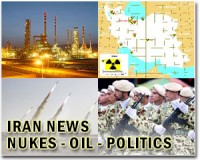| . |  |
. |
Tehran (AFP) Oct 29, 2009 President Mahmoud Ahmadinejad said Thursday conditions were ripe for nuclear cooperation with the major powers as the atomic watchdog received an Iranian response to a UN-brokered plan. Breaking with his usual hardline rhetoric, Ahmadinejad hailed what he said was a change in Western policy from "confrontation to cooperation" that had made cooperation possible over Iran's nuclear programme. "We welcome fuel exchange, nuclear cooperation, building of power plants and reactors and we are ready to cooperate," the Iranian leader said in a speech broadcast live on state television. The International Atomic Energy Agency said it received a response from Tehran to the UN-brokered plan, without detailing its contents. IAEA Director General Mohamed ElBaradei had "received an initial response from the Iranian authorities to his proposal to use Iran's low-enriched uranium for manufacturing fuel for... the Tehran Research Reactor, which is devoted mainly to producing radioisotopes for medical purposes," the watchdog said. ElBaradei was "engaged in consultations with the government of Iran as well as all relevant parties, with the hope that agreement on his proposal can be reached soon." But the United States said later Thursday it was still awaiting a "formal" reply from the Islamic republic. "We need to hear a formal response from Iran... We'll see what kind of clarifications we get," said US State Department spokesman Ian Kelly, adding there was "complete unity" among the IAEA, the United States, Russia and France -- the four parties negotiating with Tehran. Iranian media said earlier Tehran was seeking some changes to the fuel supply proposals, while the country's envoy to the IAEA said he expected to be involved in further negotiations. But Ahmadinejad insisted his government, for so long on a collision course with the West over its refusal to heed repeated UN Security Council ultimatums to suspend uranium enrichment, was keen to strike a deal. He said the West had previously talked of "halting and suspending everything, but now they are talking about fuel exchange, nuclear cooperation, building nuclear power plants and reactors. They have moved from confrontation to cooperation." As a result, "the conditions for nuclear cooperation are ready." "Now the IAEA is returning to its actual position which is to help independent nations and to create healthy relations with other nations," he said, referring to the UN watchdog which this week inspected a second uranium enrichment plant Iran is building south of the capital. Alluding to the three sets of UN sanctions imposed on Iran over its failure to suspend uranium enrichment, Ahmadinejad said the West had previously adopted a policy of "confrontation and threats, but today it has changed its attitude and we welcome it. "We accept any hand extended to us in trust and honesty, without any plot or lie. But if that proves not to be the case, our response will be the same as we gave to (US president George W) Bush and his cronies," he said to cheers from the crowd. Uranium enrichment is the sensitive process that lies at the heart of Western concerns over Iran's nuclear programme. It can produce fuel for nuclear reactors or, in highly extended form, the fissile core of an atomic bomb. Under the terms of the deal drawn up by the IAEA and already approved by Western governments, Iran would export to Russia more than 1,200 kilos (2,640 pounds) of its 3.5 percent low-enriched uranium (LEU) for refining up to 20 percent purity to fuel a Tehran reactor that makes medical isotopes. France would then fashion the material into the fuel rods for the reactor. Iran had originally been expected to respond to the proposals last week but delayed its answer until Thursday amid conflicting views within the regime. The Islamic republic's hardline Javan (Young) newspaper said Tehran was set to seek changes to the pace at which it shipped out its LEU under the proposed agreement. It would offer its stock "gradually" in several batches rather than sending out the full 75 percent of its supplies in one go as envisaged in the IAEA draft, the newspaper said quoting an unnamed informed source. Or, it would seek to receive highly enriched uranium fuel at the same time as it hands over its LEU stock "as per a formula to be calculated by the IAEA based on the needs of the Tehran reactor." burs/dv/hkb Share This Article With Planet Earth
Related Links Learn about nuclear weapons doctrine and defense at SpaceWar.com Learn about missile defense at SpaceWar.com All about missiles at SpaceWar.com Learn about the Superpowers of the 21st Century at SpaceWar.com
 Iran nuclear deal only buys West time: diplomats
Iran nuclear deal only buys West time: diplomatsParis (AFP) Oct 29, 2009 Iran's apparent readiness to strike a nuclear deal with the international community might take some heat out of the standoff but will not end fears over its alleged quest for the bomb, diplomats say. Under the proposed agreement, Iran would send its stockpile of 1,200 kilos (2,640 pounds) of low enriched uranium to Russia and on to France, where it would be refined for later use in ... read more |
|
| The content herein, unless otherwise known to be public domain, are Copyright 1995-2009 - SpaceDaily. AFP and UPI Wire Stories are copyright Agence France-Presse and United Press International. ESA Portal Reports are copyright European Space Agency. All NASA sourced material is public domain. Additional copyrights may apply in whole or part to other bona fide parties. Advertising does not imply endorsement,agreement or approval of any opinions, statements or information provided by SpaceDaily on any Web page published or hosted by SpaceDaily. Privacy Statement |